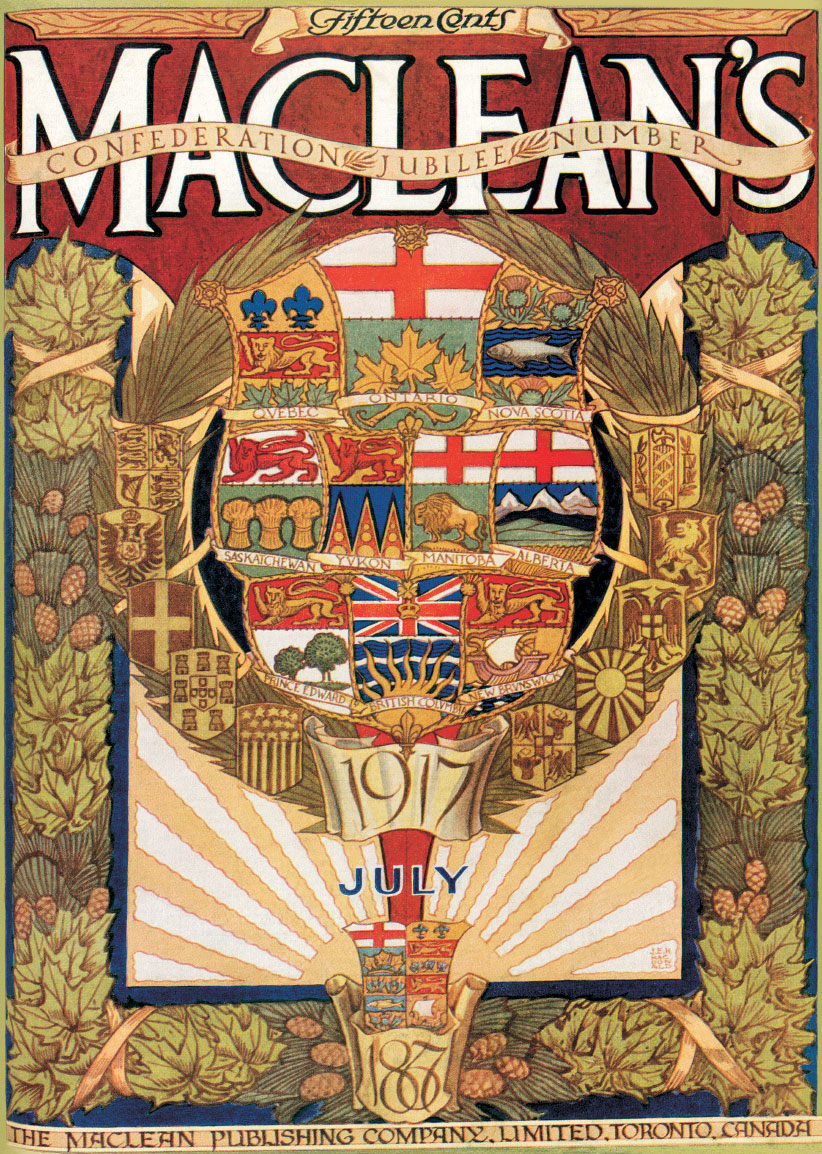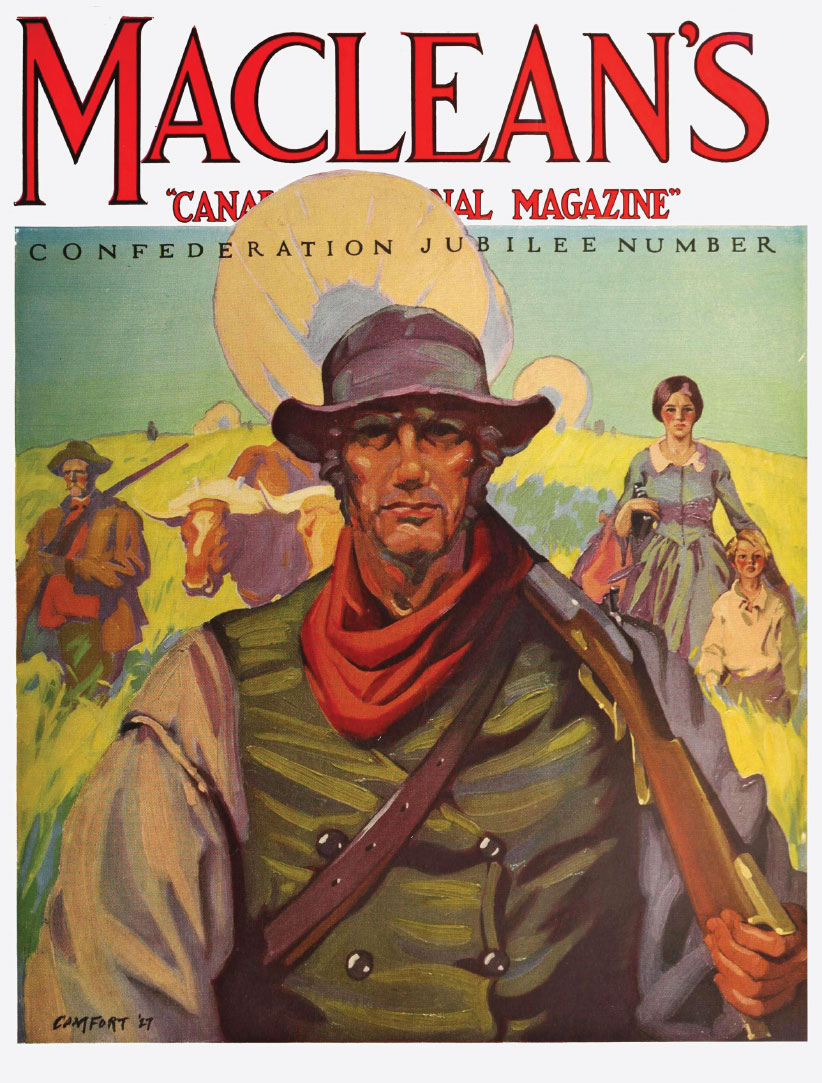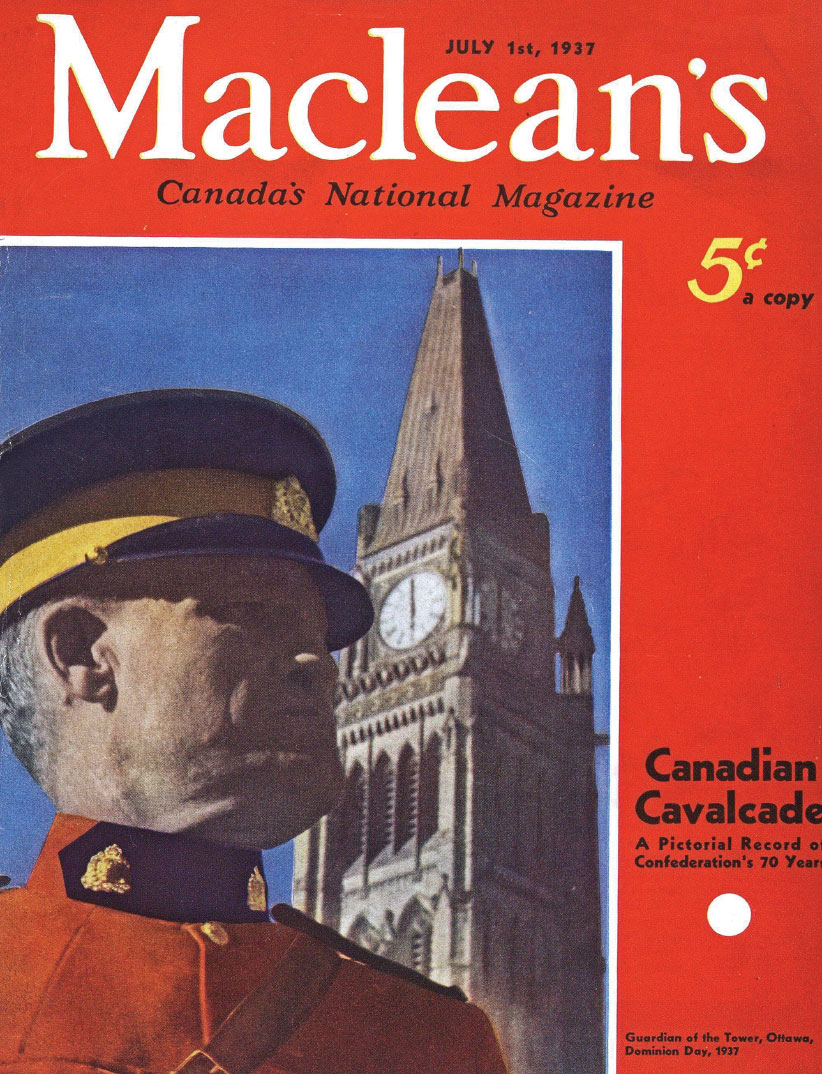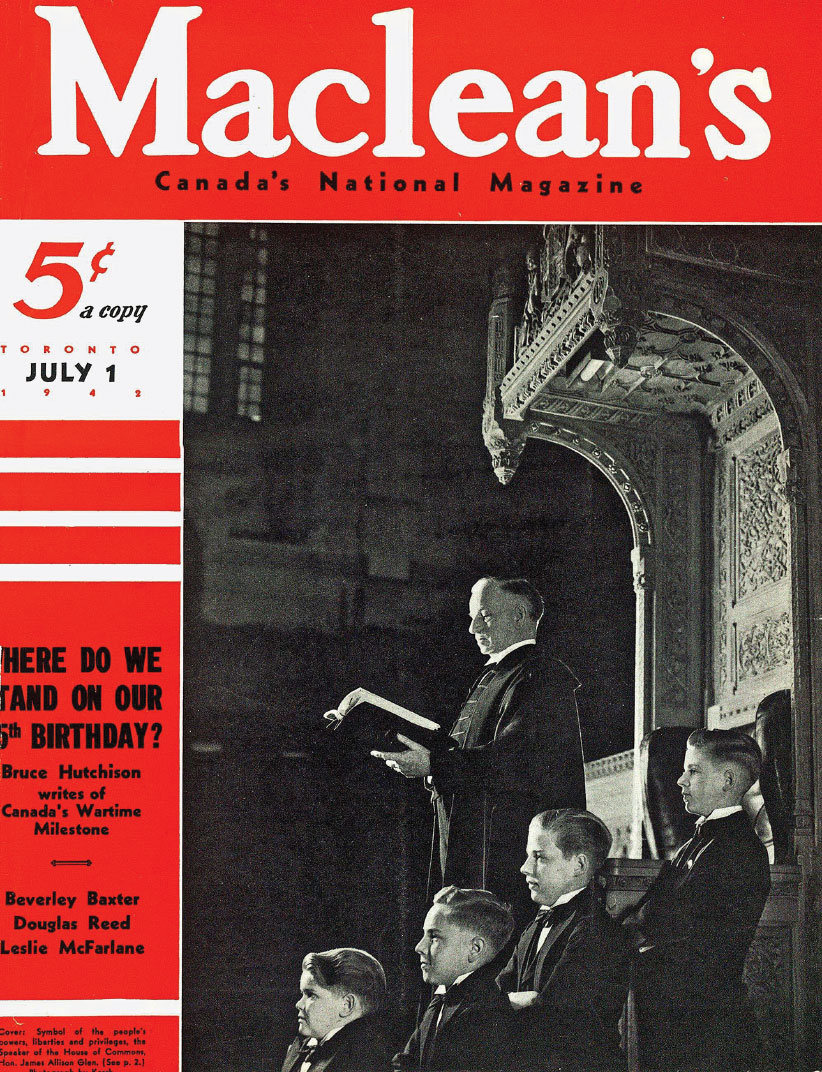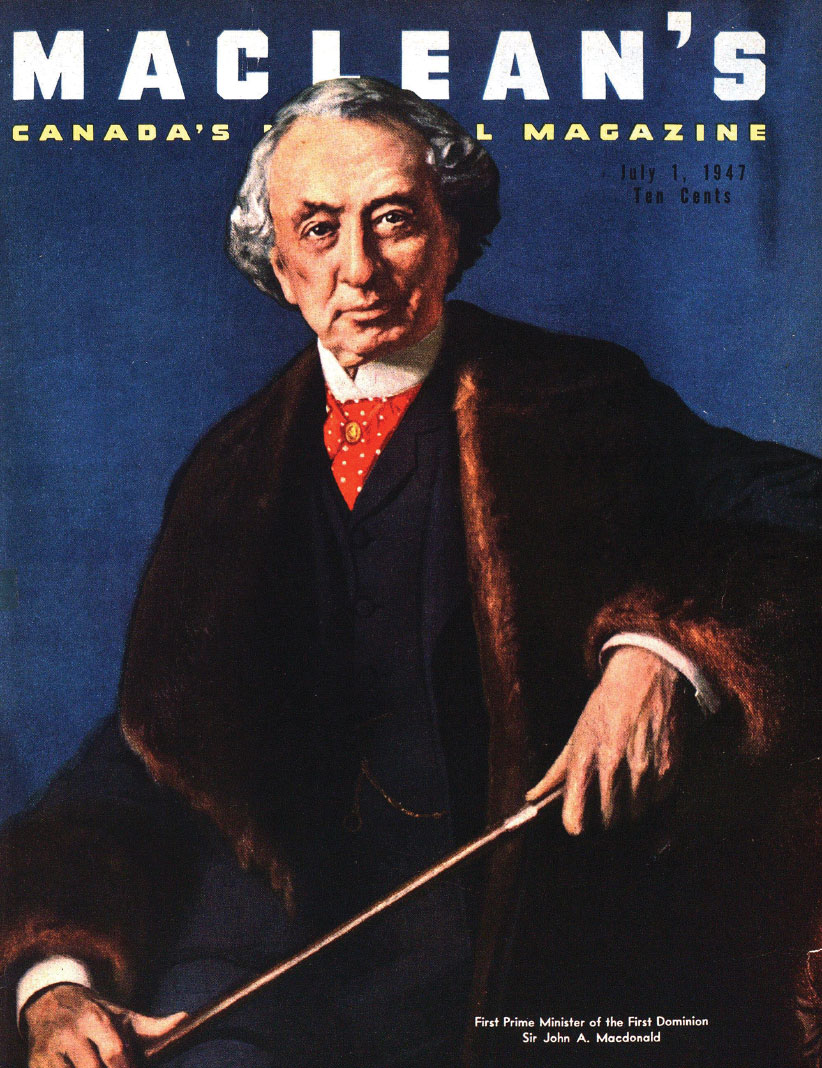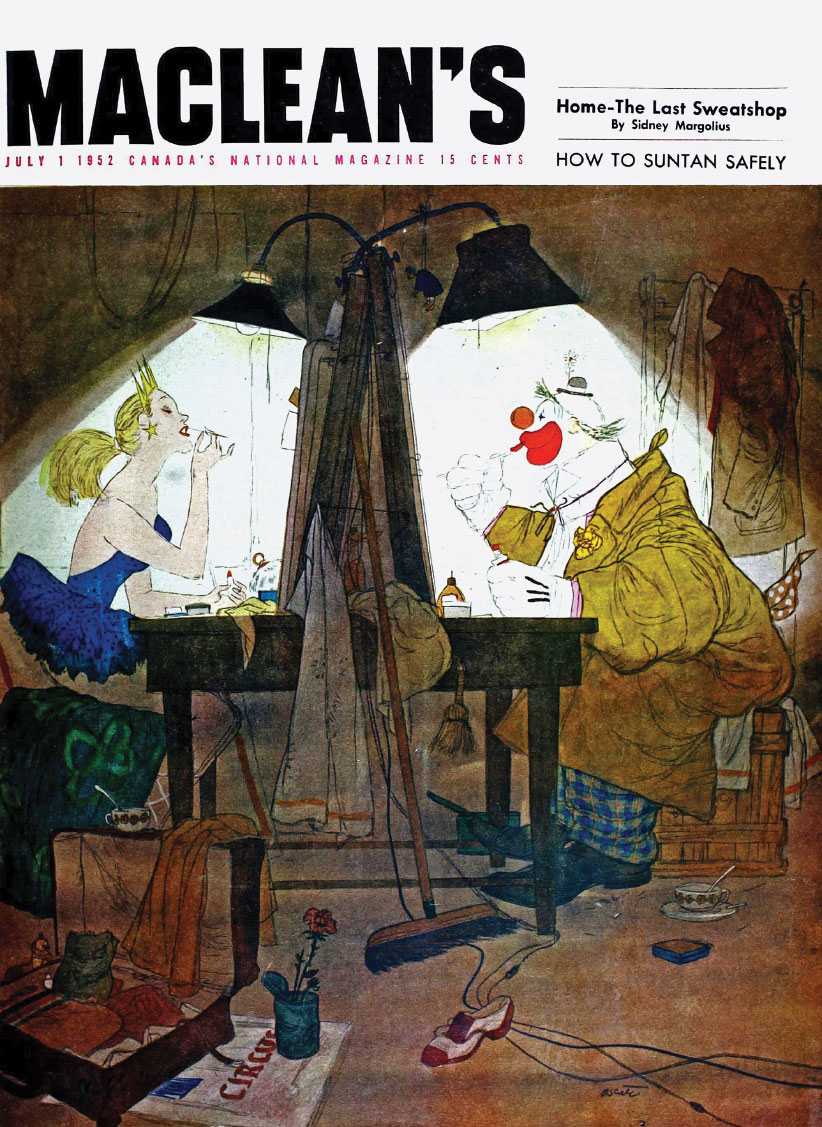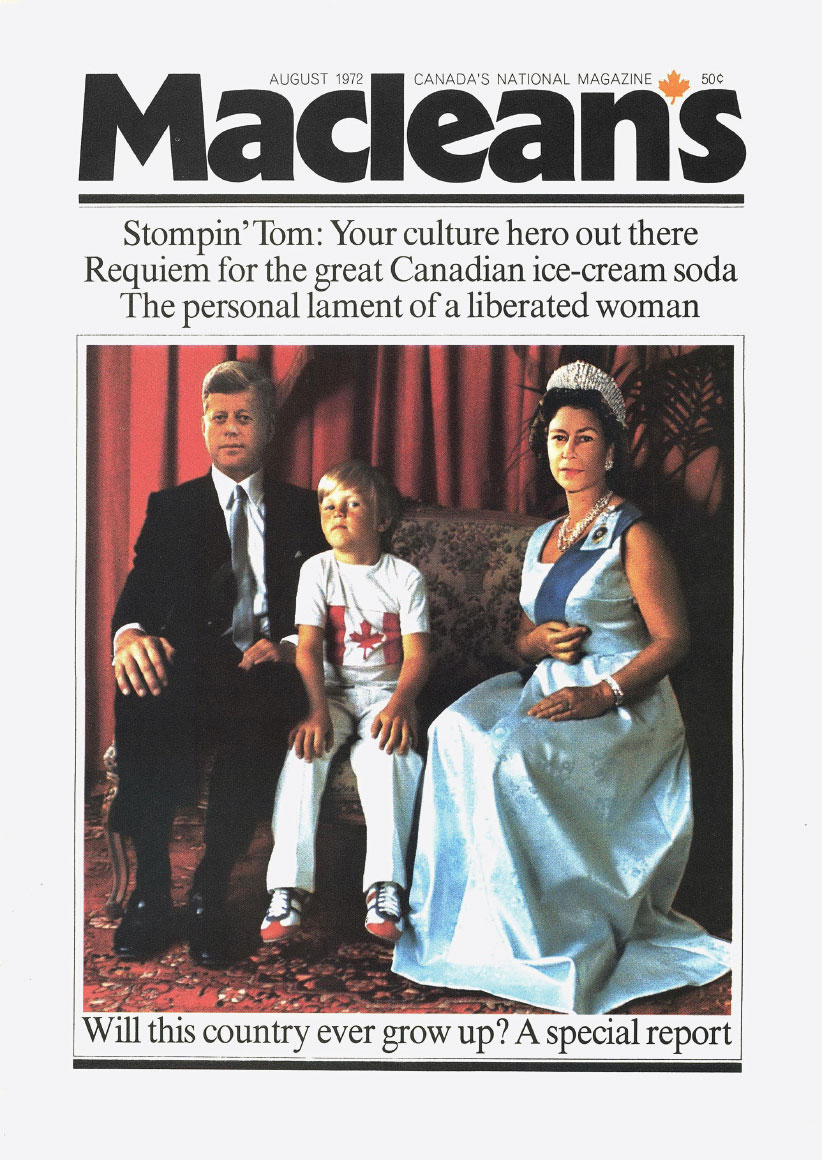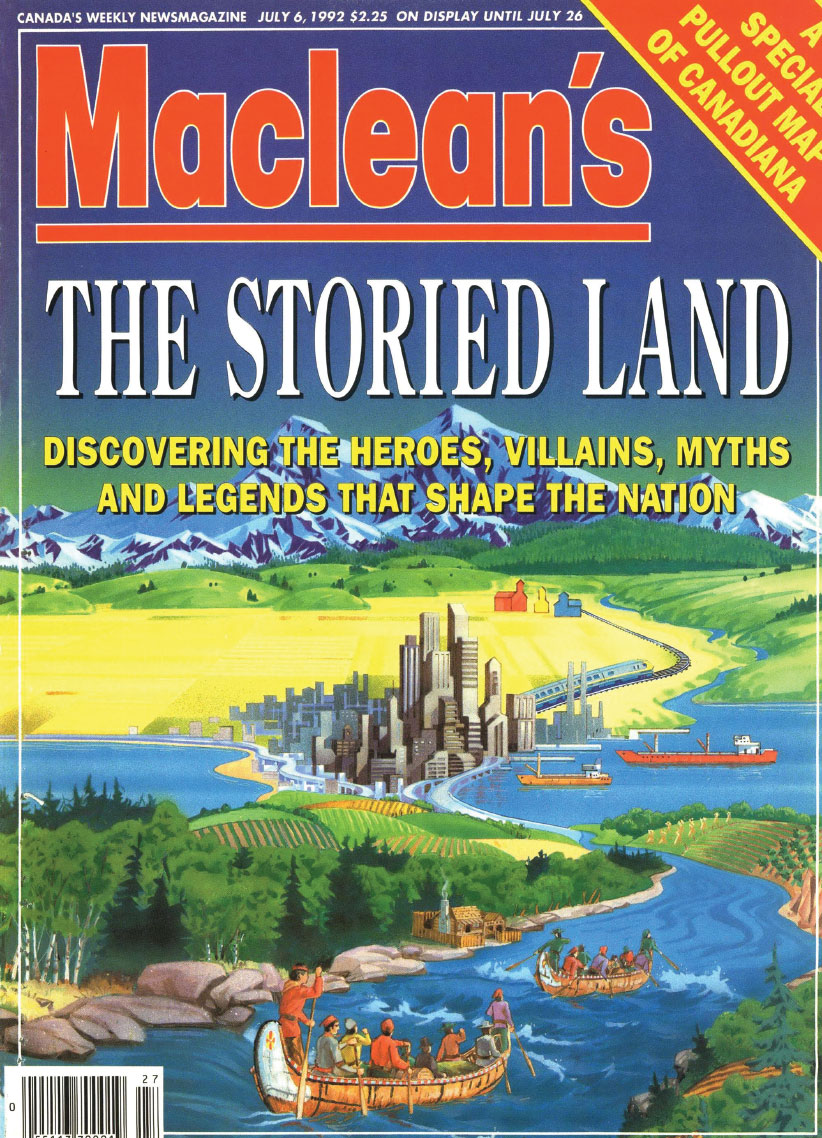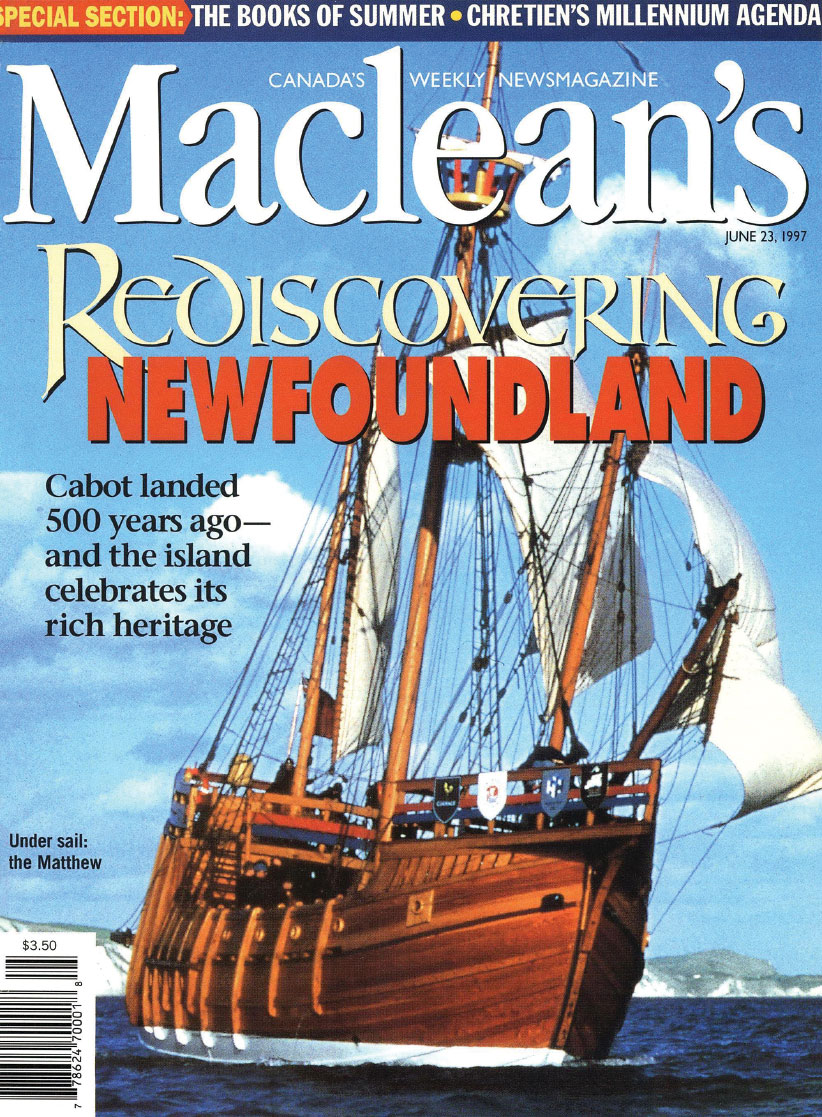How Maclean’s marked Canada’s anniversary over the last century
Looking back at how the magazine celebrated our country on past anniversaries
“Ottawa, Canada – July 1, 2011: People crowd the streets during Canada Day in downtown Ottawa, Ontario. Canada Day is celebrated annually and is a national holiday.”
Share
Maclean’s has been alive for 112 of Canada’s 150 years. Over the decades, the magazine used various anniversaries to reflect on the country. Our editorialists, columnists and journalists recounted achievements and failures. They offered both words of praise and words of caution for the nation and its leaders. Their words reflect events of the time from wars to civil unrest to financial hardship. What follows are excerpts taken from articles published in the magazine on previous national milestones, offering some context for the challenges we’ve overcome—and the ones we still face.
50th anniversary: The story of Confederation
By Thomas Bertram, July 1917
EXCERPT: The logical start for a story of Confederation is perhaps the dramatic moment when John A. Macdonald and George Brown, political opponents and personal enemies of long standing, met on the floor of the assembly in Quebec and solemnly shook hands on a pact which had for its immediate object the breaking of the deadlock in the government of Upper and Lower Canada, but which in reality was a first step toward the main objective—the union of all British colonies in North America. The movement really started there.
Read the full piece here.
60th anniversary: Canada rediscovered
By John Nelson, July 1927
EXCERPT: Though this country has had a national organism for 60 years, its people are just learning to “find” themselves.
Self-discovery does not come to men or to nations when they learn to work and to support themselves; not even when they start to fight. These are the adolescent stages, and Canada has been through them all. Self-revelation comes to the boy as he does his own thinking and begins to relate himself to the world and not to his parents. It is then that he takes stock of his powers and learns to use them independent of parental assistance. That is the point at which self-analysis brings self-discovery. In this, her Diamond Jubilee year, Canada may fairly be said to have reached such a stage. And that is the beginning of national wisdom.
What, then, have Canadians discovered? Canadians are learning, for instance, that theirs is no longer only a pastoral land. In the first quarter of this century, agriculture has been forced to give an equal place to manufacturing. In 25 years, the value of manufactured products has increased to 1,300 millions of dollars. Canada is no longer a nation of tree fellers, stump pullers, soil breakers or agricultural pioneers. She continues to live from the soil. She no longer depends solely on the soil. Canadians are still great pioneers, but their adventure carries them deeper than the soil.
Read the full piece here.
70th anniversary: Three score years and 10
By M. Grattan O’Leary, July 1937
EXCERPT: There must be some other way—a Canadian way. A way by and through which Canada will find some common denominator for Canadian loyalty and Canadian unity; a way which, never scorning co-operation with other lands for world good, will yet achieve that unity in Canada, for Canada and because of Canada, which does not exist today.
Such unity cannot come from across the seas. It must spring from Canadian soil, be attached to Canadian soil. It must be native. It must come from Canadian understanding of the rich soil and background of Canada’s own history; of what treasures that history possesses for a pure Canadian literature; for Canadian art, music, painting, sculpture. It must have its roots in the heritage of heroism, of authentic deeds and fascinating lore, and of the solid, substantial contributions flowing from the work of the early pioneers and explorers for the enrichment and strengthening and beautifying of Canadian life and culture.
Read the full piece here.
75th anniversary: Success and failure
Editorial, July 1942
EXCERPT: No honest Canadian can say on our birthday that we have solved the deeper problems of our society, of man’s relations with his fellows, of Canada’s relations with the world.
We find ourselves today ill-prepared for the world about us and for the forces aflame within us. The world about us is not the world the fathers expected, nor the world we wanted, nor the world we imagined while our eyes were turned to the frontier. It is a world so interdependent, so complex and tightly integrated, that our old solutions will not serve us now. Our old dependence on our own earth is not enough. Our old retreat to the wilderness has been barred against us.
We see now that there is no escape from the world, that the attempt to escape it in the 20 years between the wars was folly, paid for dearly in blood and treasure. We see that our essential problem now is one of interdependence—how to adjust our life, our economy, our daily ways to the friendly forces that can protect us, the evil forces that can overwhelm us—how we can play our part, and a great part for our size, in the future combination of democratic nations.
Independent status we have won, but independent status is not enough. It must be integrated into a larger world grouping if it is to be saved from annihilation.
Read the full piece here.
80th anniversary: Our legacy of challenge
Editorial, July 1947
EXCERPT: Pessimists said it would never work, and many a time in 80 years they have appeared to be right. Tension was chronic and painful. In every generation something new came up to cause acute strain—the hanging of Riel, the Boer War, and then the great climacterics of the world wars.
Any one of them could have wrecked Canada; each of them, until this last, very nearly did. The country always was a defiance of common sense, anyway—a skinny ribbon of differentness strung along the top of the most powerful nation in the world.
Almost any year a sensible man might have said, “This country is going to fall apart.” But not now. Not any longer. We have weathered one storm too many for that. Now, even the grimmest “realist” can be stopped by the question “If we are doomed to fail why haven’t we failed already?”
We haven’t failed because always, in the moment of crisis, we have known that the nation was worth more to us than the issue that divided it. And now for the first time we can say with some assurance that no issue can ever mean enough to any of its factions to break the nation. Now for the first time we have come out of a crisis not merely whole, but stronger.
Read the full piece here.
85th anniversary: You’re richer than you think
By Blair Fraser, July 1952
EXCERPT: Last year, an American who represented an investment firm came through Ottawa. He already had large interests in the United States and Britain, but his company had some new money to invest. After a survey of the free nations, he had decided to place all current and future investment programs in Canada.
“Best bet in the whole world today,” he told a friend here.
Canadians were rather startled to hear it. Canada has “the second-highest standard of living,” and even to our own ears, “second best” sounds very like “second rate.” In spite of our after-dinner speeches and our patriotic schoolbooks, we are secretly taken aback when anyone ranks our country first. In our hearts we don’t believe it. They must mean the people next door.
Average personal income, after taxes, for each man, woman and child in the United States last year was $1,444. In Canada it was only $1,057. For each dollar earned by the average Canadian, the average American earned $1.37; for each dollar a Canadian spent on consumer goods and services, the American spent $1.43. This gap has closed a little since 1939, when the U. S. figures were $1.44 and $1.48 respectively, but there is no present likelihood that it will disappear. Canada’s living standard will remain “second highest.”
This is an old story to Canadians. We have been telling ourselves all our lives that the grapes are sour, that we have intangibles and imponderables here which outweigh the material advantages of our great neighbour, and that “money don’t bring happiness.” We used to think of ourselves as poor but honest, schooled in the sweet uses of adversity.
To other nations, Canadians must look and sound like the impoverished tycoon who was “down to his last million.” They don’t see us as the hardy, self-denying sons of toil and austerity that we fancy ourselves to be. To them we’re rich—all of us. Moreover, we are growing richer fast. It is more than possible, it is highly probable, that before the present century has run its course Canada will have more than twice the wealth that it is enjoying today.
Read the full piece here.
105th anniversary: Left with ourselves
Editorial, Aug. 1, 1972
How can you measure the time it takes a country to discover itself? How many miles does it take to express an idea? What is the distance between feelings? Canada has always been too much a part of the imagination for simple definitions. When, for the first time, Jacques Cartier sailed up the St. Lawrence, he wondered whether this was “the land God gave to Cain.” Mike Nichols, while making a film in Vancouver, suggested that America forget Canada and “buy the ginger ale elsewhere.” Such slights are endured by Canadians because they like to live in their country first and talk about it second. And living is the opposite of expressing. (There are more jack pines in our experience than Tom Thomson could ever give us.)
So Mike Nichols might not understand, but we’ve never had an image as right for us as the tin star of Texas or the Brooks Brothers suit of Madison Avenue. If the truth were known (and we don’t like to confront the truth), we’ve always secretly believed that an image is really nothing more than the art of self-deception. Spinoza, for one, realized that all things strive to persist in their own nature: The tree eternally wishes to be a tree—the beaver, a beaver. There are no high and low cultures. Just true ones.
About five years ago, something was let loose in the consciousness of this country. A new awareness was in ascendancy in all the regions. This fresh sensitivity was beginning to make connections in the minds of the cities. The message turned out to be the realization that men only truly express themselves in harmony with their land. As usual, the people came to this understanding first, and the politicians, lost within Ottawa’s irrelevances, just never caught up.
We’ve been awakened from a deep sleep, shocked to discover that while we slept we embraced our rapists with open arms, almost tenderly. Our astonishing dependence on the mothers across the ocean and below the border had left us as impotent as a pacifist under attack. Much of what we once had was gone and we are now starting to cling to what is left.
In 1967, Expo showed us that maybe we were 20 million people worth saving. A year later, during the apocalyptic months of 1968, Camdot collapsed and left us alone with ourselves whether we liked it or not. Men on TV became foreign for the first time to tell us that Martin Luther King was dead and that Robert Kennedy was dead and that what was left of our share of the American Dream was the rage and the deadness in Vietnam and on the streets of Chicago. We started to see the thin distinctions that separate the givers from the losers. The changes of these past years have shaped us as much as any time in our not so extravagant history.
Today, right now, there is a new mood alive in the land — a different kind of Canadianism — a celebration of what we already are rather than what we could be. The failure of America is the failure of impersonal centralization and we’ve always felt the regions more deeply than the head offices. Our decentralization is a fact of our cultural spirit. Or so we keep telling ourselves. And someone’s listening (20,000 Americans emigrated to Canada last year). On the next six pages Maclean’s examines what the New Canuckism is and where it came from. But, first, remember that Pierre Laporte is dead. And remember what Spinoza said. And remember that time’s running out. And remember that we can import value but we can’t import values. And remember that Canada will be here tomorrow but your dreams won’t. Or is it the other way around?
Icons to live by
By Carl Mollins, July 6, 1992
EXCERPT: Canadians, in their culture, mirror the land. Simply to survive in its forbidding expanse and climate, the people fostered bonds of communication and mutual help for “peace, order and good government.” The country’s icons have been unifying institutions: the railway, the telegraph, the telephone and the CBC, along with the co-operative movement, medicare, bilingualism and the practice of rich provinces assisting the have-nots through monetary transfers.
That culture was challenged as the country grew and changed from a scattered, largely rural population of about 3.3 million at Confederation to 27.3 million mostly urban people, almost one-third of them in the Toronto, Montreal and Vancouver metropolitan areas alone. But the historical impulse to build systems that unite the regions remains powerful. More than seven out of 10 Canadians (at least slightly more proportionately than in other major industrial countries) work in service industries: transport, communications, commerce, finance and public administration.
Read the full piece here.
The country is strong
By Robert Lewis, June 23, 1997
EXCERPT: As the nation’s 130th birthday approaches next week, there are many good things to celebrate. On the economic front, the signs are encouraging. Canada’s growth is second only to that of the United States among the G7. Indeed, Canada may become the first among the group to eliminate the budgetary deficit and start paying off its national debt.
More important, in matters of the human spirit, the land is strong. The outpouring of support across the country for Manitobans during the flood of the century was a heartwarming reminder of our pioneering roots and an era when neighbours helped each other without questions asked. The strong commitment to social programs was evident during the federal election.
And despite glaring acts of intolerance and racism, Canada is a welcoming place for people of the world who are making a major contribution to our success. It is only 50 years since Canada established its own citizenship act, independent of Britain, yet another reminder of what a young nation we are. That anniversary will be marked in a special Parliament Hill ceremony on July 1. It may not be an event marked by howitzers or superlatives. But it certainly is worthy of a salute. And if there is a countdown, this time it will have to be in several languages.
Read the full piece here.
